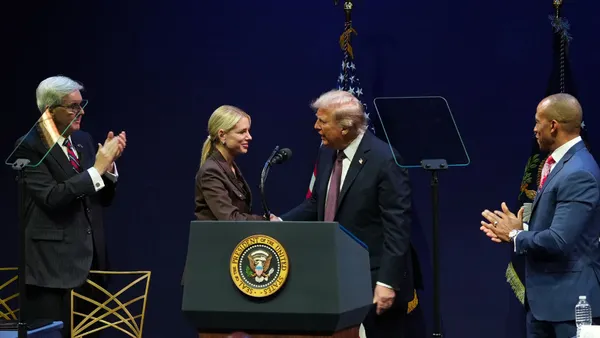Dive Brief:
-
A bill working its way through the Wisconsin legislature is raising alarm among science education groups because of specific language that could dampen how topics are taught.
-
AB 510, a parental rights bill, would allow parents to opt children out of classes or instructional materials based on religious or personal conviction, require “timely notice” when a “controversial subject” will be taught or discussed, and allow parents or guardians to sue a school, district or teacher if they believe a school has failed to apply the law.
-
Glenn Branch, deputy director of the National Center for Science Education, said these provisions may produce a chilling effect on classroom teaching. “If enacted, the bill would have the effect of not only stopping schools and teachers from taking any action, but also chill them from doing anything in the vicinity of it, because of knowing parents and guardians who could take that action.”
Dive Insight:
While AB 510 does not single out science education and topics, details in the bill concern Branch. He noted that there are few parameters or limits for a parent or guardian choosing to opt their child out of a class other than a religious or personal conviction. In science, topics like evolution and climate change have been frequent subjects of public debate in that regard.
Opt-outs create an additional burden for teachers, Branch said. For instance, educators need to find other places for students to go to while the lesson is taught and craft options that continue to help that student meet their learning goals.
Additionally, Branch said, there’s concern that if too many students are opted out of a class or topic, the lesson itself could end up not being taught in future years. In that way, a topic or subject could be removed from the curriculum through pressure.
“It might be so unpopular that a substantial portion of the class may have opted out and exerted a heckler’s veto not to teach that subject even if a substantial portion would prefer it taught,” Branch said.
Branch encourages educators — not just those in Wisconsin — to voice their concern about the bill to their legislators and also through their professional organizations, as he sees the passage of AB 510 as problematic for all science educators. He also said that districts — which could better withstand pushback or a lawsuit brought by a parent or family — should be assuring educators they will support them if such a law passes.
“It’s important that districts, which have more resources than individual teachers, back up their teachers and make responsible choices,” Branch said.
In Wisconsin, Gov. Tony Evers, a former science teacher and administrator, has previously vetoed similar legislation.






 Dive Awards
Dive Awards






